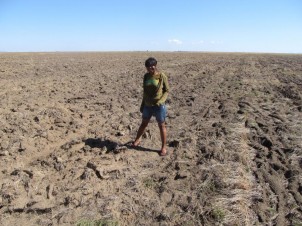
Madagascar was in the international spotlight in 2009, after an attempted deal with South Korean company Daewoo with ambitions to lease half the country’s area sparked widespread protests lead to the fall of former president Ravalomanana. Yet is appears that other big land deals are still supposedly in the work in Madagascar.
The Italian company Tozzi Green cultivates the biofuel crop jatropha on the Ihorombe plateau in the Central South of Madagascar. It aims to cultivate 100 000 ha. The company says that it set up in this region with the agreement of the local people, but locals have no idea whose agreement they refer to. On November 16th last year, ten representatives of nine villages in Ihorombe, came to Antananarivo to show their opposition to this project. “People with no connection to our customs are imposing their own laws on us”, said one chief. “Armed people are evicting us from our lands. The loss of grass is leading to the death of our animals on the spot. They have destroyed the graves of our ancestors. Most of the inhabitants are leaving in exodus and becoming homeless.” The reactions of the media to the press conference were diverse: some kept quiet, others wrote about it without naming the company in question and others reported on it by accusing the village representatives of being accomplices of bandits.
Then, on 18 November, 350 inhabitants signed a petition, which they sent to the local and national authorities asking them to intervene to stop the expansion of the plantations and to prevent their eviction from the areas being targeted by Tozzi Green and by the Indian company Landmark. These grievances come on top of the reports and claims of the inhabitants of the villages of Satrokala, Andiolava, Soatambary and Ambatolahy from whom the Collectif pour la Défense des Terres Malgaches (TANY) received testimonies. They say they have inherited the lands of their great-grandparents who had farmed according to the ancestral customs there. These lands are not titled and do not have boundaries but are customary family possessions dating back several generations. If the State obliges them to give up these lands, their income from cattle raising will be lost. Thanks to this income, they have been able to send their children to school. On December 1 the chiefs received a warning letter from the State not to disrupt the expansion of Tozzi Green. A conflict is clearly brewing.
A large part of the population in the Ihorombe plateau is composed of Bara breeders and the open spaces which certain city-dwellers see as “idle land” are the pasture zones of their zebus. Some countries respect and strictly manage these pastoral zones through a Charter or a Rural Code, but the successive leaders and decision-makers of Madagascar have neglected them.
At present, of the 8 000 ha already granted, 2 000 ha are allegedly exploited. According to the promotion by Tozzi green, “The project registers 170 permanent employees and approximately 2 000 seasonal workers among which more than 50% are native of the Ihorombe region”, but according to TANY, the benefits in terms of employment are miniscule compared to the economic, social and cultural damages being inflicted.
TANY is asking for transparency of all the details of the lease. They ask: How many hectares are covered by the current contracts? How are the procedures and the conditions of progressive land allocations for the company formulated? What criteria are used by the Steering Committee to evaluate the results and to decide to approve a new extension? What does the incongruous “2 000 ha still in trial phase” hide? They demand that citizens must be informed about the complete contents of the contracts: which authorities signed them, what compensation is planned? What fate is reserved for the people who live on these lands in accordance with customary laws? All these questions remain unanswered. These questions concern not just the national and local authorities, but all the citizens of all the regions of the island as important precedents are being set for other interested parties who hope to acquire land in Madagascar.
Herders’ communities are mobilizing for better treatment from State leaders. In October 2012, after traveling to Europe, a high level State authority in charge of land went to Ihorombe to receive a 4×4 vehicle and computers intended for the Domains and Topography services, as a “result of a collaboration with Tozzi Green”. Did the visit of this high authority in the region coincide with a new extension of areas allocated to Tozzi Green, increasing the justifiable concern of the populations? Tozzi Green has announced the implementation in Satrokala of a land office that will deliver land certificates on untitled private properties, which has outraged locals.
TANY demands a full stop to the intimidation of Ihorombe citizens who dared to ask that the extension of lands granted to the company Tozzi Green be halted. Total transparency of the contents of the contracts signed by the State is urgently needed. As we write, news from a local source comes in that famine is starting to set in for the communities that lost grazing land to Tozzi Green. Many zebus were killed, there are no more cassavas (because a big area is scraped by Tozzi Green) and the remaining stock of rice is almost gone.
More information:
http://www.slateafrique.com/82535/madagascar-la-lutte-contre-les-accaparements-de-terres-continue
http://www.facebook.com/TANYterresmalgaches

The project ENVJUSTICE has received funding from the European Research Council (ERC) under the European Union’s Horizon 2020 research and innovation programme (grant agreement No. 695446)